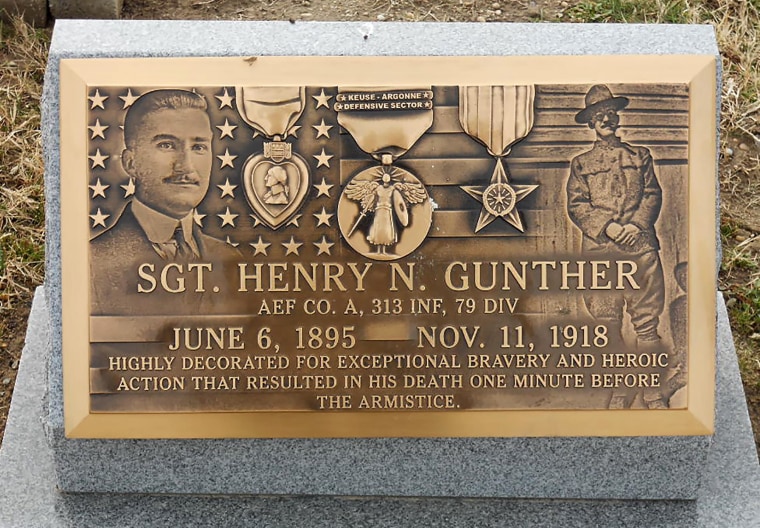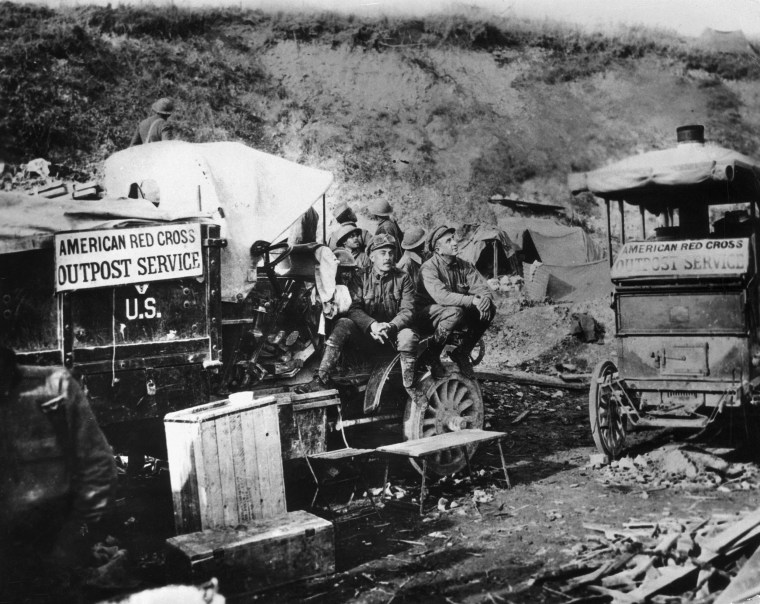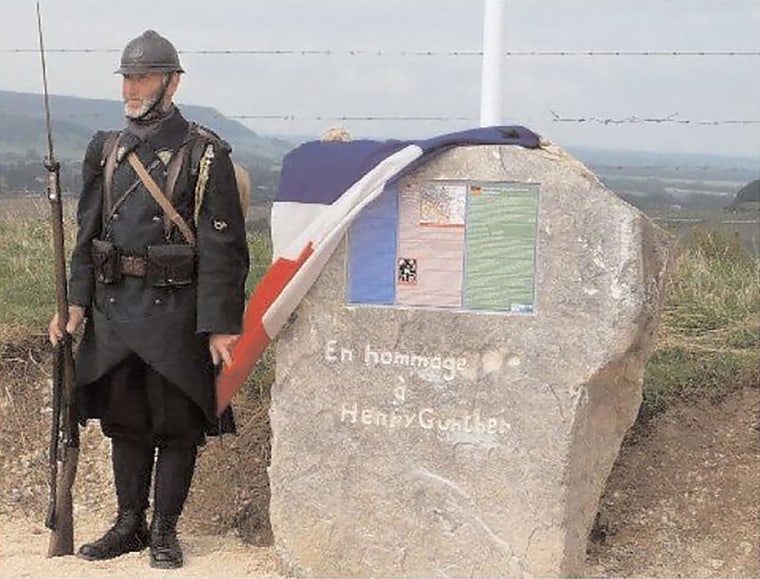He was the last American killed on the battlefields of World War I, felled by a German bullet just one minute before the armistice. But almost a century later, the circumstances of Sgt. Henry Gunther's death remain a matter of debate among historians.
Was he a brave hero who charged into an ambush by German soldiers in the final minutes of of the Great War? The senseless victim of military commanders who kept the fight up hours after a cease-fire was signed? Or a conflicted warrior with something to prove who signed his own death warrant?
As Gunther's family prepares to lay flowers at his grave site in Baltimore's Most Holy Redeemer Cemetery on Tuesday — to mark his death, the armistice and Veteran's Day — even they admit they don't have all the answers.
"The family’s kept an open mind about what actually happened to my great-uncle," Gunther’s great-nephew Joseph Long, himself a Vietnam War veteran, said by phone from Baltimore. "You had to be there to really know."
The official view is etched in a bronze plaque at the foot of Gunther’s grave: "Highly Decorated for Exceptional Bravery and Heroic Action that Resulted in His Death One Minute Before the Armistice."
A U.S. Army citation states that, on Nov. 11, 1918, during the Battle of the Argonne Forest, Gunther’s unit — Alpha Company, 313th Regiment, 79th Infantry Division — ran into a German ambush near the French town of Chaumont-devant-Damvillers, north of Verdun.
At the same time, a message had arrived with word that the war would be over within the hour. That’s when Gunther — pinned down by enemy fire and visibly angry — bolted, with bayonet fixed, and charged the German machine-gun nest. At least one bullet shattered his head. It was 10:59 a.m.
Gen John Pershing, commander of the American Expeditionary Forces, ordered that Gunther be named the last American to die on the battlefield. Five years later, Gunther’s remains were returned to Baltimore with full military honors.

But investigative reporting over the years painted a more nuanced picture, one that suggests Gunther’s final heroic "charge" was as much about slaying his own demons.
Of German descent, he and his family had become targets of growing anti-German sentiment. "We were told growing up that the local pharmacist accused my grandmother of being a German spy," Long said. "The police took her in, but she was later released. It was a pretty tense time."
By the time he was drafted in 1917, Gunther had a steady job as a bank bookkeeper and had just been engaged.
"He had absolutely no desire to be in that war, but who would?" Long said. "Especially to be killing Germans."
Worse, he had just been busted in rank from sergeant down to private, according to a contemporary Baltimore Sun reporter, James Cain, who interviewed many of Gunther’s platoon mates. (Gunther’s rank was posthumously reinstated).
Apparently, a letter he’d written to a friend bashing Army life and warning him against enlisting made it into the hands of the U.S. military censors. As Cain wrote at the time, "He thought himself suspected of being a German sympathizer. The regiment went into action a few days after he was demoted and from the start he displayed the most unusual willingness to expose himself to all sorts of risk."
Meanwhile, eyewitnesses described the so-called German "ambush" more as warning shots fired overhead. Stunned German soldiers were said to have yelled at Gunther in broken English to stop — that the war was over — but to no avail.
"Gunther still must have been fired by a desire to demonstrate, even at the last minute, that he was courageous and all-American," Cain wrote.

But other historians also point out that it was Gunther’s officers who gave the order to take the high ground back, knowing full well the war was about to end. Rather than sitting tight on Nov. 11, Allied commanders sent messages across front lines to attack the enemy even during those six hours between the signing of the cease-fire and its execution.
“Allied leaders found outrageous excuses to send 13,000 men to their deaths against a defeated enemy,” the late Joseph Persico wrote in his highly critical book, "11th Month, 11th Day, 11th Hour." Almost 3,000 Americans died, including Gunther, that fateful morning — more than were killed on D-Day.
"Hopefully we've learned some lessons from that brutal war"
Clearly, the public’s perception, about World War I and its last American victim, has changed over the years.
"The generation that grew up with Gunther’s legend in Baltimore would have regarded him as the last brave American to die in the nation’s noble effort to end a long, horrible conflict of dubious purpose in Europe," wrote Dan Rodricks, another Baltimore Sun reporter covering the 90th anniversary of the Allied victory in 2008.
"Today, looking back through the lens of history, we might see Gunther’s death differently — as foolish, unnecessary, ironic, like the ‘Great War’ itself."
Joseph Long said the relatives have come to see his infamous great-uncle as partly a hero and partly a young, conflicted man who found himself in the middle of a nightmare and had something to prove.
"Hopefully we’ve learned some lessons from that brutal war," he said.

It’s become harder now to keep Gunther’s memory alive. A fire nine years ago destroyed the family home, and almost all of Gunther’s mementos — even his letters from the front lines — went up in flames. Only his Purple Heart survived.
Still, despite the passage of time and all the controversy, the family is proud of its historical figure.
Long, 61, hopes someday to visit France to see for himself the stone memorial the government built on the spot where Sgt. Henry Nicholas Gunther fell, at the very moment the war’s guns fell silent with him — the final scene in an epic tragedy that had been repeated more than 17 million times.